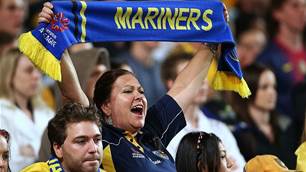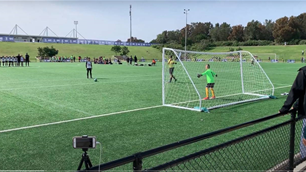The FFA must look to video refereeing to improve the A-League
A weekend in the A-League would not be complete without refereeing controversy and Round 8 did not fail to deliver. As is so often the case, the man in the middle provided many talking points, both for calls he did and did not make.
The penalty awarded following Jonatan Germano’s controversial handball in the Mariners’ fixture against Melbourne Heart was the focus of much attention during the half time and post match commentary and the referee came under strong criticism from fans and commentators alike.
It is one thing to criticise referees but another to actually take action against those who make incorrect decisions. In the past, the FFA has been reluctant to stand referees down following strings of blatantly incorrect decisions, preferring to use the Match Review Panel to retrospectively referee decisions. Although this does help to pick up on things that may have been missed or wrongly penalised, it does nothing to revoke the effects of an incorrect decision made in game.
As a football fan, I find it shocking that referees have not been made more accountable for their decisions. What are they, a protected species? Sure, we don’t want to be too harsh and discourage people from becoming referees but there must come a time when the FFA needs to recognise that enough is enough. If a tougher stance is not going to be taken (such as performance review, suspensions or professional referees for the league) then some form of video refereeing must compensate for this.
Watching a game at home, we have video replays from many different angles almost instantly. How hard would it be to have the fourth (or even a fifth) official analysing these to double check the referee has made the right call? Even if it was just employed for penalty decisions and harsher tackles, it would surely result in an improvement in refereeing standards.
Putting more pressure on referees to lift their game would not necessarily be a bad thing. If the same level of protection was given to football coaches and players, nobody would ever be under any pressure to achieve anything. The reality is there’s pressure in every job and refereeing is no different. The nature of refereeing makes it harder to make correct decisions 100% of the time but when referees are shielded from criticism there will never be any incentive for them to turn out better performances.
Some prefer to argue that things even out over time. I’ve seen my team punished countless times by referees (2008 Grand Final anyone?) but I’ve also seen them benefit from equally controversial decisions. Suffice to say a referee-aided win over Melbourne Heart will not heal the pain of losing a Grand Final in the dying seconds but it does show that what goes around comes around. Even within the Mariners/Heart game, it could be argued that the two controversial Mariners goals were countered by the decision not to take action against Wayne Shroj for his dangerous elbow to Rostyn Griffiths’ face early on in the game.
Having said that, the complexion of both aforementioned games could have been completely altered by video refereeing. And if you were a Melbourne Heart fan, you could conceivably argue that fortune has not swung back in your favour much this season, so the ‘karma’ argument is not always valid.
Video technology would not remove subjectivity from refereeing but it would go some way to ensuring teams are not unfairly punished. On the topic of red cards, for example, opinion is often divided and varied. Many greeted Matthew Foschini’s sending off in Round 5 with dismay, however, there was an element of football fans who agreed that, while harsh, his tackle technically warranted a sending off. Had the decision been reviewed by the video replay, who knows what would have been given? What it would have done, however, would either have reinforced the letter of the law or recognised that, in the heat of the moment, the referee acted impulsively and made a harsh call.
Would video refereeing undermine the authority of referees? You could put that spin on it. You could equally argue that it would merely recognise human fallibility and force referees to make a more balanced decision to avoid being overruled.
Putting in place a system of checks and balances would result in a fairer contest for all. Let’s face it – with technology allowing media criticism of sport to reach an all time high, it can’t be too long before we see the straw that breaks the camel’s back. I only hope that the FFA decides to lead the way in implementing in-game video refereeing before we see another important fixture ruined by a referee.
Related Articles

Revealed: New buyer’s pitch to reinvigorate A-League's Mariners

Fresh talent flock to ambitious A-League outfit's pro pathway













